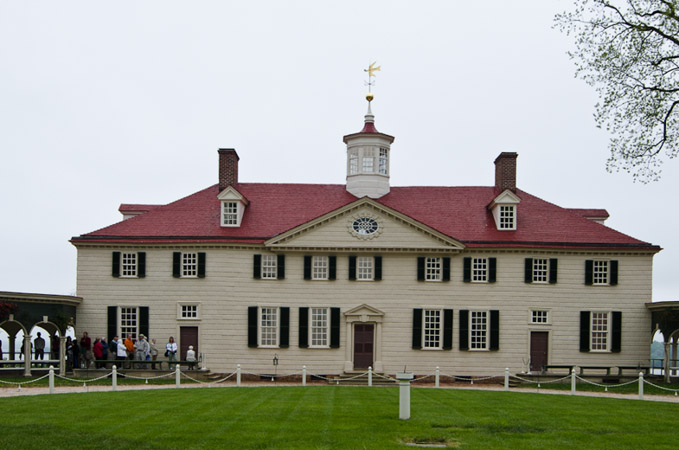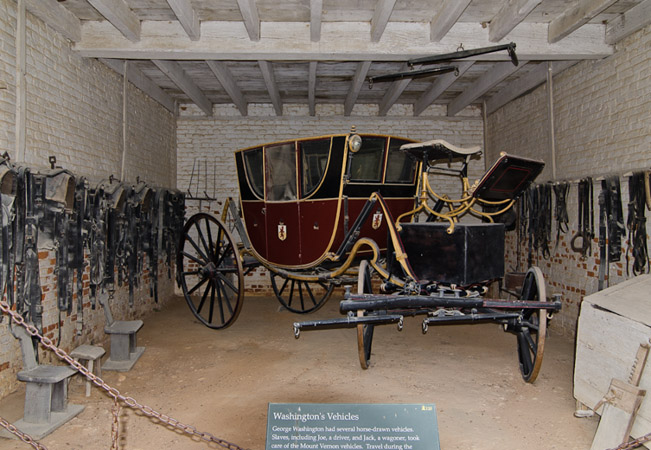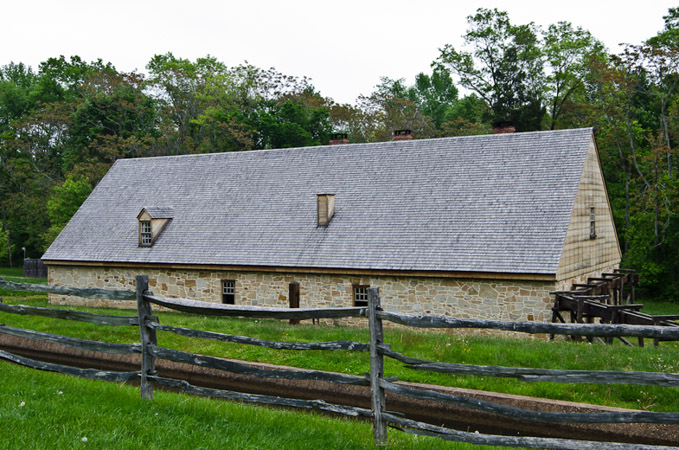Mount Vernon
 Washington was born into the provincial gentry of Colonial Virginia; his moderately prosperous planter family owned tobacco plantations and slaves. Virginia gentry considered the elder Washington as “middling rank” rather than one of the leading planter families. Washington, as a young man, was a land surveyor, notably well paid for in land for his labors, over his lifetime he purchased land as a continuing speculative interest. It was customary at this time in history for land surveyors to be paid in land as currency was harder to obtain. Thomas Jefferson was also paid in land for his surveyor duties. Washington's Mount Vernon plantation totaled 8,000 acres, his total acreages, obtained over the years, reached 51,000 situated all over the country.
Washington was born into the provincial gentry of Colonial Virginia; his moderately prosperous planter family owned tobacco plantations and slaves. Virginia gentry considered the elder Washington as “middling rank” rather than one of the leading planter families. Washington, as a young man, was a land surveyor, notably well paid for in land for his labors, over his lifetime he purchased land as a continuing speculative interest. It was customary at this time in history for land surveyors to be paid in land as currency was harder to obtain. Thomas Jefferson was also paid in land for his surveyor duties. Washington's Mount Vernon plantation totaled 8,000 acres, his total acreages, obtained over the years, reached 51,000 situated all over the country.
Washington's exploits are well chronicled but to see where he called home brought it to life. Mount Vernon is a magnificent plantation furnished with exquisite furnishings without being ostentatious. Understated elegance at its best. Among his many accomplishments Washington was an astute businessman and by the standards of the day listed among the richest of men.
Washington's marriage to the wealthy Martha Dandridge Custis greatly increased his property holdings and social standing, and made him one of Virginia's wealthiest men. He acquired one-third of the 18,000-acre Custis estate upon his marriage, worth approximately $100,000, and managed the remainder on behalf of Martha's children, for whom he sincerely cared. The average blue collar worker earned about $40.00 per year.
standing, and made him one of Virginia's wealthiest men. He acquired one-third of the 18,000-acre Custis estate upon his marriage, worth approximately $100,000, and managed the remainder on behalf of Martha's children, for whom he sincerely cared. The average blue collar worker earned about $40.00 per year.
Mount Vernon is situated on the Potomac River about 18 miles from D.C., a major highway in its day, and Washington used it to move his product of tobacco and wheat to market. Washington was one of the first farmers to see that tobacco was terribly debilitating on the soil and moved much of his cash crop to wheat. Wheat provided more consistent cash flow and less soil depletion. In the autumn of his years he became a distiller and became the largest seller of whiskey in Virginia. It wasn’t just a whimsical notion to start a distillery; his farm manager suggested the project and Washington researched the distilling operation along with the credentials of his manager. The business started on a small scale until profits could be substantiated prior to moving to a full scale investment.
 Washington died at the age of 67 after working in a cold rain; in retirement at Mount Vernon, he contracted an illness causing his throat to swell. It probably didn’t help that his physician proscribed bleeding, subsequently removing half of his blood. Without modern antibiotics his throat swelled and he suffocated to death.
Washington died at the age of 67 after working in a cold rain; in retirement at Mount Vernon, he contracted an illness causing his throat to swell. It probably didn’t help that his physician proscribed bleeding, subsequently removing half of his blood. Without modern antibiotics his throat swelled and he suffocated to death.
Contemplating the greatness of George Washington it strikes as reasonable to be compared with the morality and honor of today’s leaders. It was considered, in some circles at that time, that he should be crowned king. Washington soundly rejected the idea and indicated the republic should work to make a successor its goal. Washington felt a democratically elected succession was the path to a long standing free country. How many of today’s leaders would reject the role of king?
Photography is not allowed in the interior of Mount Vernon. Click here for the slideshow of the pictures we took of the exterior and grounds. For a virtual interior tour: click here.